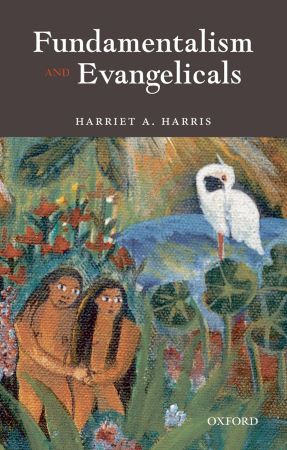Harriet Harris: Fundamentalism and Evangelicals
 Harriet A. Harris, Fundamentalism and Evangelicals (Oxford Theological Monographs; Oxford: Oxford University Press, 1998 [2008 in paperback]), 400 pages, ISBN 9780199532537.
Harriet A. Harris, Fundamentalism and Evangelicals (Oxford Theological Monographs; Oxford: Oxford University Press, 1998 [2008 in paperback]), 400 pages, ISBN 9780199532537.
Fundamentalism and Evangelicals is a revealing and fascinating book. Harris gives a close and objective reading of the evidence that modern evangelicalism is ruled by a fundamentalist mindset, which, as Harris defines it, primarily has to do with an insistence on the factual content of Scripture. This book is not so much about naming two separate streams (evangelicalism and fundamentalism), but rather about the fundamentalist side of evangelicalism. This book is largely a (mostly friendly) response to James Barr’s critique of fundamentalism (found in Fundamentalism [1977] and Beyond Fundamentalism [1984], along with various articles). It is therefore worth noting that Barr largely agreed with Harris’s response, which is strong testimony to its worth: “[W]here she differs from my own past judgements, I generally accept her correction” (review of Harris, in Journal of Theological Studies 51 [2000] 408-11). Although Harris is aware that the terms “fundamentalism” and “evangelicalism” should not be used interchangeably, she pointedly allows a good deal of the overlap to remain in the reader’s mind throughout this book. This inevitably will annoy some readers (as no one really wants to be called a “fundamentalist”), but I found it challenging and refreshingly honest. I say this even though I count myself an “evangelical” (in the broader sense of the word).
Harris is the chaplain of Wadham College (Oxford University), and, as such, her treatment of evangelicalism is somewhat stronger from the English side than from the American side. I should also note that her discussion of Pentecostals is not always accurate. For example, Harris mistakenly refers to the Journal of Pentecostal Theology as a “British counterpart” to the journal Pneuma (p. 82 n. 12). Undoubtedly she was confused by the (then) location of the imprint (Sheffield, England). In terms of editorship and the balance of contributions, both journals are American.
Harris obviously does not care for the fundamentalist insistence that the truth of Scripture lies in its factual content. Like so many before her, she tries to connect the propositionalist focus of modern evangelical hermeneutics with the Common Sense Realism of the Scottish Enlightenment. Her attempt falls flat, as it fails to consider propositionalism on its own. Harris falls victim to the idea that you can debunk a view simply by deconstructing its history. In this case, the error is double, in that propositionalism is a notion going back way earlier than Common Sense Realism. Harris’s alternative to propositionalism represents the weakest point of the book. Her rather dismissive attitude to the notion that Scripture is primarily propositional (and to the question of how factualness relates to truth) is disappointing, as she shows little regard for the historical genre of much of Scripture, nor does she trace out the “fundamentally” factual content of the gospel message lying at the center of the New Testament. In this regard, I have to say that James Barr’s books on fundamentalism still hold the edge, as he never loses sight of the creedal shape of Christian belief.
Category: Ministry, Winter 2010


